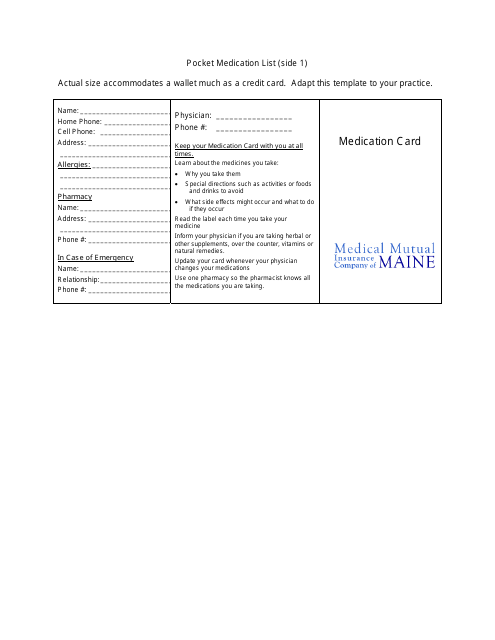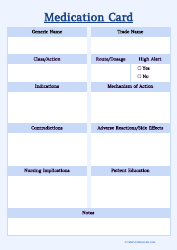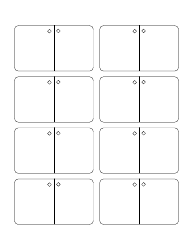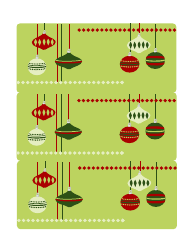Medication Card
A Medication Card, also known as a Medication List Card or a Medication Wallet Card, is a handy and portable tool that contains a list of all the medications that a person is taking. This includes over-the-counter drugs, prescription drugs, vitamins, and supplements. It generally indicates the name of the medication, the dosage, the frequency of intake, and the reason for taking it.
Its purpose is to help individuals and medical professionals keep track of a person's medication regimen. This is important especially during emergencies or when visiting a new healthcare provider. A Medication Card helps to prevent drug interactions, duplicates in therapy, and promotes better communication between the patient and the healthcare provider. It can be especially beneficial for elderly individuals, people with chronic diseases, or anyone taking multiple medications.
The Medication Card is typically filed by healthcare professionals like doctors, nurses, or pharmacists. These professionals administer or prescribe medicines and keep a record of it on the Medication Card. It can also be maintained by patients or their caregivers as a personal record of medication history. The procedure may vary slightly based on country-specific healthcare systems, but the individual responsible is typically one who is involved in the administration or monitoring of the medication.
FAQ
Q: What is a medication card?
A: A medication card (also known as a drug card or medicine record card) is a card that records medication information. It is typically used by individuals who are on multiple medications to keep track of their prescriptions, dosages, and administration times. The size of a credit card, it's convenient to carry in a wallet or purse.
Q: Why is it important to have a medication card?
A: A medication card is important because it helps in preventing medical errors. It provides necessary information for healthcare providers, like doctors and pharmacists, about your current medications, allergies, etc. This is especially useful in an emergency when you may be unable to provide this information.
Q: What information should be included on a medication card?
A: A typical medication card should include the medication name, dosage, frequency (how many times a day it is taken), route of administration (oral, injection, etc.), prescribing doctor's name, date of prescription, allergies to medications, and a record of any adverse reactions.
Q: Are medication cards recognized internationally?
A: While the format of medication cards may vary from country to country, the concept is widely recognized. However, it is always advisable to check specific regulations before travelling. For example, carry a translated version if the country's language is not English.
Q: How often should a medication card be updated?
A: A medication card should be updated whenever there is a change in your medications, dosages or frequencies. This change can be due to a new prescription, discontinuation or change in dosage of a drug. In general, it is a good practice to review it every time you visit a healthcare provider.
Q: Beyond medicine, what other information can be included in a medication card?
A: Beyond the list of active medications, a card can also include information about immunizations, allergies, blood type, medical conditions, emergency contacts, preferred hospital, and health insurance information.










